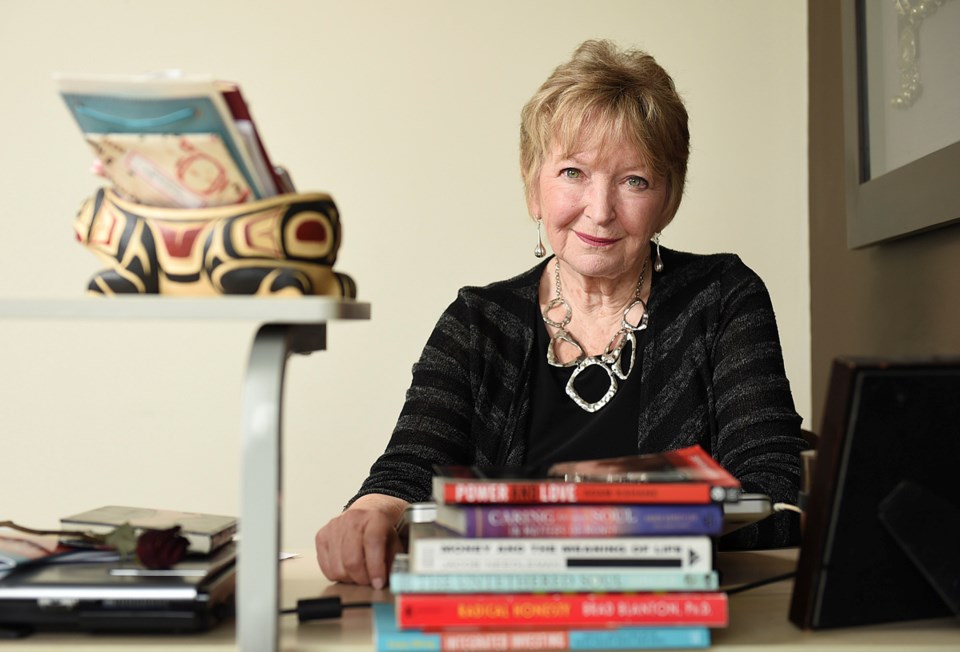Unless we have a career in a field that is particularly fulfilling, most people probably consider our work life quite distinct from our spiritual life.
âAll of us have our internal world, all of us have a need to be effective in the external world that we share, and our body is kind of what mediates those two realities,â says Dr. Peggie Merlin, who offers an ongoing series of programs called Body, Soul and Business.
Like a lot of people, Merlin believes that segregating parts of our lives may not be the healthiest approach.
âWe are looking for a way for people to find the kind of choices and movement that allow us to be effective in the world, while honouring our internal reality,â she says of her program, which is offered through the Ontogony Evolution Centre (which Iâll explore in a future column).
A âmentorship and practice group,â the 15 or 20 people who participate in the three-month sessions explore together the spiritual and psychological dimensions of life.
Merlin was once executive director of the Cold Mountain Institute on Cortez Island, which in its heyday was a gestalt therapy centre and a destination for seekers of various sorts. She has been working in the realms of psychology and spirituality for many years and says there are people who emphatically choose one or the other.
âI know a lot of people who have been in psychology, because that is my field, who haven't really opened much to their spiritual nature. And I know a lot of people on a very aggressive spiritual path who havenât begun to settle their neurotic material,â she says, laughing. âWhat I tend to attract in these groups are people who are really willing to lean into what I call their human homework. That's not everybody's taste. Some people are very content to ignore the whole spiritual side. Some people are kind of allergic to thinking psychologically. Some people are thrilled to be into a fundamentalist set of simple explanations. It's an individual thing.â
For those willing, her program offers an entryway to get to know oneself better through a range of approaches, including mutual support in a group setting that is ideal for people who, she says, âhave a desire for an awareness and expanded consciousness, a realization of who they are and what is driving them.â
The first of the three sessions in the series focuses on clarity and purpose.
âIt is what you desire in a larger sense, in terms of values and quality, and then setting some specific goals that support that vision,â says Merlin. Participants might be starting something like a business project or a relationship, or they could be in what she calls âtransition moments,â during which they are designing a new direction for themselves.
âIt could be very specific or it could be fairly large and existential,â she says, adding that the group setting is helpful, regardless. âWhat we really know is that it is so much easier to create when you are in the company of good-willed, cooperative, like-minded people who are willing to hold your focus in their minds as well and be a kind of resource to each other.â
Participants are given some homework projects and a buddy system to support them between sessions.
The second session is about manifesting, which Merlin frequently animates through a discussion of money, which may be a far more loaded spiritual and psychological topic than most people think.
âMoney is something that we all have in common,â she says. âWhether we have a little money or we have a lot of money, it is a reality that we deal with. Most of us have quite a bit of baggage connected to it that is not needed on the voyage. ⦠People who don't have money pretend they do. People who have a lot pretend they don't. In most families, it's not even good manners to talk about it.â
Most people grow up largely illiterate about money, she says, despite the centrality it plays in our lives, for better or worse.
âThen we also have a lot of emotional reactivity to the subject that keeps us from being good learners,â she says. âMost of us have an example of some sort of kink or glitch in our relationship to money.â
The third session is about relatedness.
âPartnering and partnership, the perils and the possibilities, whether we're talking about personal relationships or professional relationships, there are some principles that apply and that help you create trust and ease and effectiveness,â she says. âBecause when you talk about partnership, what comes up, of course, are issues of power struggle and communication and ultimately co-creativity, of conflict resolution, of trust â and there are skills that we can hone and there are aspects that we can consider or reconsider that will help us bring more ease, more grace and more excellence into our relationships and our relationship choices.â
Merlin has been influenced by the University of California, Berkeley professor Jacob Needleman, a philosopher and scholar of religion.
âHe says, if you want to take the true measure of someone, observe how someone handles sex, time and money. ⦠If you observe your relationship to those three, you will bump into a great many of your own core beliefs,â she says. In the process, she says, people will often discover that what seems to be part of their âoperating systemâ is actually a bug.
Finding a way to integrate every aspect of our lives in a holistic way crucial to living well.
âWhether or not you have a religious affiliation, you have a spiritual nature,â Merlin says. âThat comes with being a human being. That is what we are addressing. There are many choices for addressing it, but it is up to each of us to find a way to honour what really is our spirit, our most authentic sense of self.â
@Pat604Johnson



